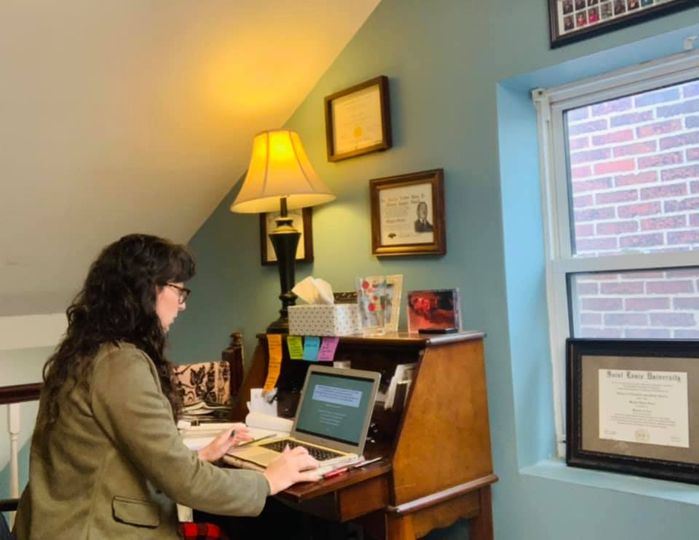THREAD  : Becoming #DrGreen
: Becoming #DrGreen
Today I successfully defended my dissertation making becoming Dr. Green a formality at this point in time! It was an emotional ride to get to this point. When they say it takes a village, it really does. 1/
 : Becoming #DrGreen
: Becoming #DrGreenToday I successfully defended my dissertation making becoming Dr. Green a formality at this point in time! It was an emotional ride to get to this point. When they say it takes a village, it really does. 1/
I want to thank my dad, who went from homeless in his youth, to being the first in our family to go to college, to earning his PhD. While his propensity to tell me, “think, child think,” caused much frustration for me as a child, today I'd have it no other way. 2/
I also would like to thank my mother, Margaret Green, a retired English teacher and teacher’s union President. She taught me not just how to write, but to love to write, and how to advocate for workers and students. I’m proud to stand with on the shoulders of my parents. 3/
I also want to thank my dog Dewey, for being the best research assistant and companion that a grad student could have, Maud Essen for her tireless efforts in helping me format my dissertation, and @FeferNahuel on being my guinea pig for my defense. 4/
My dissertation was on the political legal for the ability of the interdistrict socioeconomic integration of St. Louis school districts as a tool for education reform. 5/
Prior research is overwhelming on the benefits of socioeconomically integrated educational environments for both low and middle income students, but especially for low-income students. 6/
Additionally, with a 2007 Supreme Court ruling that race can no longer be used at the determining factor in school assignment, with a few exceptions, socioeconomics becomes the proxy for achieving racial integration too. 7/
Whether through my work at the Board Of Aldermen, or my doctoral work, my interest remains in studying and pursuing structural changes. 8/
There are two types of Socioeconomic integration of school districts, interdistrict and intradistrict. 9/
I studied interdistrict because St. Louis is so economically and racially segregated that only one school district has enough socioeconomic diversity in their student populations within school district boundaries to create socioeconomically integrated schools. 10/
I started down this path toward 7 yrs ago and took a number of detours along the way, including running for office. I now know that those detours were necessary b/c it needed to be done in a post-Mike Brown, post-George Floyd, & in the middle of COVID-19 to get these findings 11/
As STL was rocked this past week by a proposal to close 11 schools, in addn to stopping the excessive allocation of tax breaks & the proliferation of charter schools causing closures, there needs to be a sense of urgency in examining our regional school district structures. 12/
Funny enough, part of the reason that I went down this path of study was after attending one of the very first Better Together sessions years ago where they announced that education would not be one of the areas of fragmentation that they were looking at. 13/
I thought back then, as I do now, that addressing school district fragmentation in our region is perhaps the most meaningful thing that we could do to change the trajectory not just for our youth in our region, but for our entire region. 14/
While the STL region has engaged in the Voluntary Interdistrict Transfer Program for nearly 40 years, the St. Louis Region has not attempted a structural reorganization of education to produce socioeconomic integration since the failed Spainhower Commission attempt in 1968. 15/
For more information on the Spainhower Commission 
https://files.eric.ed.gov/fulltext/ED026171.pdf
16/

https://files.eric.ed.gov/fulltext/ED026171.pdf
16/
We have an incredibly fragmented educational system in the St. Louis region with 23 school districts and greater fragmentation created through the proliferation of private schools and charter schools. 17/
The way we address the fragmentation in our educational system through the proliferation of private schools and charter schools is through addressing the fragmentation of our public school district boundaries. 18/
Fortunately, my research produced findings that political stakeholders may be at place to begin to create these changes as I identified the presence of the overarching value of regional equity and the valuing of all of our kids through funding their futures. 19/
With that said, my findings also indicated an acknowledgment of the challenges of bringing these values into action. These are challenges that I hope that we can overcome in efforts to achieve the other shared commitments identified in the research findings. 20/
I have a little more work to do to get my research into it’s final publishable format to be made public, & my hope is that the work is not something that sits in a shelf, but rather is a starting point for bigger conversations & action. 21/
There is still more work to be done on studying the political feasibility in addn to studying the social and logistical feasibility. It is my hope that I can partner with an academic institution or grant making org to continue this work & eventually move policy into action. 22/
Our region, and especially our public educational system, needs structural changes to produce equity. I’m thrilled to be done and look forward to writing the next chapter, whatever that may be.
Thank you to everyone who supported this journey. 23/ Fin.
#DrGreen
Thank you to everyone who supported this journey. 23/ Fin.
#DrGreen

 Read on Twitter
Read on Twitter


